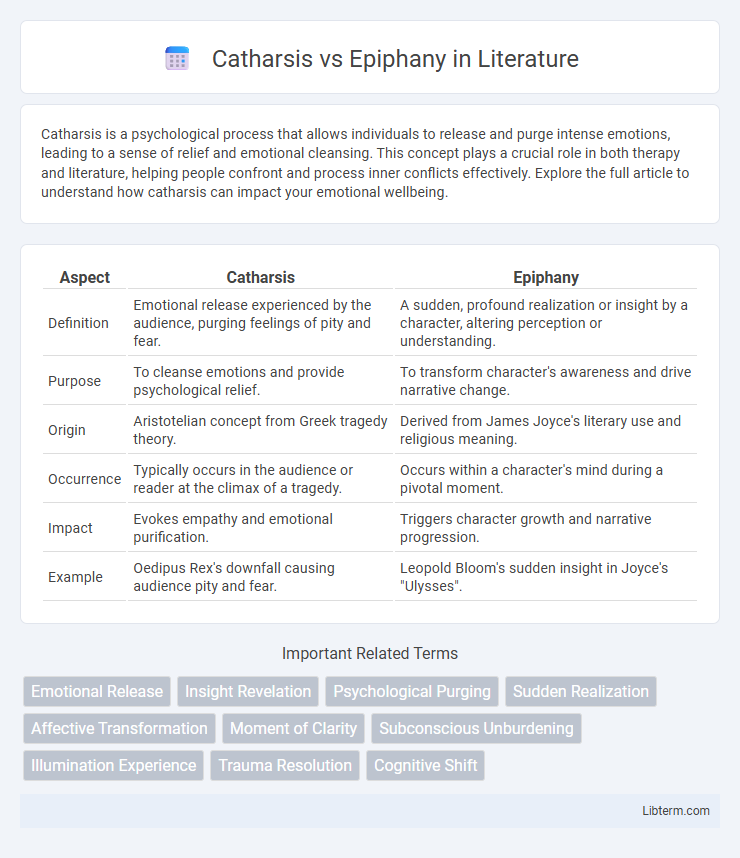Catharsis is a psychological process that allows individuals to release and purge intense emotions, leading to a sense of relief and emotional cleansing. This concept plays a crucial role in both therapy and literature, helping people confront and process inner conflicts effectively. Explore the full article to understand how catharsis can impact your emotional wellbeing.
Table of Comparison
| Aspect | Catharsis | Epiphany |
|---|---|---|
| Definition | Emotional release experienced by the audience, purging feelings of pity and fear. | A sudden, profound realization or insight by a character, altering perception or understanding. |
| Purpose | To cleanse emotions and provide psychological relief. | To transform character's awareness and drive narrative change. |
| Origin | Aristotelian concept from Greek tragedy theory. | Derived from James Joyce's literary use and religious meaning. |
| Occurrence | Typically occurs in the audience or reader at the climax of a tragedy. | Occurs within a character's mind during a pivotal moment. |
| Impact | Evokes empathy and emotional purification. | Triggers character growth and narrative progression. |
| Example | Oedipus Rex's downfall causing audience pity and fear. | Leopold Bloom's sudden insight in Joyce's "Ulysses". |
Understanding Catharsis: Definition and Origins
Catharsis, rooted in Aristotelian philosophy, refers to the emotional release experienced by an audience through the unfolding of a tragedy, allowing a purging of feelings such as pity and fear. Originating in ancient Greek theater, the concept emphasizes a psychological cleansing that leads to renewal and emotional balance. This process contrasts with epiphany, which involves a profound sudden realization rather than an emotional purgation.
What is an Epiphany? Key Characteristics
An epiphany is a sudden, profound realization that leads to a deep understanding or insight, often transforming a character's perspective or decision-making. Key characteristics of an epiphany include its spontaneous nature, emotional impact, and its ability to shift the narrative trajectory by revealing essential truths previously unnoticed. This moment contrasts with catharsis, which centers on emotional release rather than intellectual awakening.
Historical Context: Catharsis in Ancient Philosophy
Catharsis, rooted in ancient Greek philosophy and drama, particularly Aristotle's Poetics, describes the emotional purification or relief experienced by an audience through the unfolding of tragedy, aiming to restore moral balance and psychological stability. This concept was central to classical theater, where witnessing tragic events triggered a profound cleansing of pity and fear, aiding viewers' emotional and ethical development. In contrast, epiphany emerged later as a literary device denoting a sudden, profound insight or realization often experienced by a character, emphasizing intellectual awakening rather than emotional purification.
Psychological Insights: How Epiphanies Happen
Epiphanies occur through sudden cognitive restructuring, allowing individuals to integrate new information with existing knowledge, which triggers profound insight and emotional clarity. This psychological process often follows periods of subconscious incubation, where the brain unconsciously processes complex problems before the moment of revelation. Unlike catharsis, which involves emotional release and purification, epiphanies primarily facilitate transformational learning and problem-solving through rapid mental reorganization.
Literary Examples: Catharsis and Epiphany in Storytelling
In literary storytelling, catharsis appears prominently in Sophocles' tragedy *Oedipus Rex*, where the audience experiences a profound emotional release through Oedipus' tragic downfall. Epiphany is famously exemplified in James Joyce's *Araby*, where the protagonist undergoes a sudden moment of self-realization and clarity. Both techniques serve pivotal roles: catharsis resolves built-up emotional tension, while epiphany offers transformative insight, enriching character development and thematic depth.
Emotional Impact: Comparing Catharsis and Epiphany
Catharsis triggers a profound emotional release by allowing individuals to purge pent-up feelings, leading to a sense of relief and renewal. Epiphany, on the other hand, delivers sudden clarity or insight that transforms one's understanding and emotional state instantly. While catharsis often involves a gradual buildup of emotions culminating in release, epiphany sparks immediate emotional and cognitive shifts through newfound awareness.
Catharsis vs Epiphany: Core Differences
Catharsis involves the emotional release experienced by an audience through the protagonist's struggles, leading to a sense of purification or relief, while epiphany refers to a sudden, profound realization or insight experienced by a character that changes their understanding or perspective. Catharsis primarily engages the audience's emotions, creating a collective empathetic response, whereas epiphany centers on a character's intellectual or spiritual awakening, driving narrative transformation. The core difference lies in catharsis being an emotional cleansing for the viewer, whereas epiphany is an internal moment of revelation for the character.
The Role in Personal Growth and Healing
Catharsis involves the emotional release that helps individuals confront and purge suppressed feelings, facilitating psychological relief and healing. Epiphany, on the other hand, represents a sudden, profound insight that shifts one's understanding and mindset, often leading to transformative personal growth. Together, these processes are vital in therapy and self-discovery, with catharsis clearing emotional blockages and epiphany inspiring meaningful behavioral change.
Creative Expression: Using Catharsis and Epiphany
Creative expression harnesses catharsis by channeling intense emotions into art, enabling personal release and audience emotional resonance. Epiphany in creativity sparks sudden insight or revelation, transforming perspective and fueling innovative ideas. Both processes deepen artistic impact, with catharsis clearing emotional blocks and epiphany inspiring breakthrough understanding.
Conclusion: Choosing Between Catharsis and Epiphany
Choosing between catharsis and epiphany depends on the emotional impact and narrative purpose desired in storytelling. Catharsis delivers a powerful emotional release that allows audiences to purge feelings of pity or fear, while epiphany provides a sudden revelation or insight that drives character development and plot progression. Selecting the optimal approach hinges on whether the goal is to evoke deep emotional connection or to inspire transformational understanding in the audience.
Catharsis Infographic

 libterm.com
libterm.com